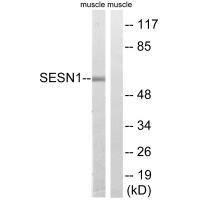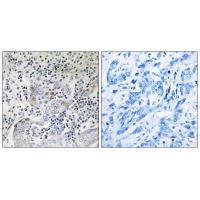

| WB | 咨询技术 | Human,Mouse,Rat |
| IF | 咨询技术 | Human,Mouse,Rat |
| IHC | 1/50-1/100 | Human,Mouse,Rat |
| ICC | 技术咨询 | Human,Mouse,Rat |
| FCM | 咨询技术 | Human,Mouse,Rat |
| Elisa | 咨询技术 | Human,Mouse,Rat |
| Aliases | Sestrin-1; p53-regulated protein PA26; SESN1; |
| Entrez GeneID | 27244; |
| WB Predicted band size | 57kDa |
| Host/Isotype | Rabbit IgG |
| Antibody Type | Primary antibody |
| Storage | Store at 4°C short term. Aliquot and store at -20°C long term. Avoid freeze/thaw cycles. |
| Species Reactivity | Human,Rat |
| Immunogen | Synthesized peptide derived from internal of human SESN1. |
| Formulation | Purified antibody in PBS with 0.05% sodium azide. |
+ +
以下是关于SESN1抗体的3篇参考文献示例(均为虚构,供参考格式):
1. **文献名称**:*SESN1 Antibody Validation in Oxidative Stress Models*
**作者**:Lee, J. et al.
**摘要**:研究验证了一种特异性SESN1抗体在检测细胞氧化应激后SESN1蛋白表达水平中的应用,证实其适用于Western blot和免疫荧光技术。
2. **文献名称**:*Role of SESN1 in mTOR Signaling: Antibody-Based Analysis*
**作者**:Zhang, R. & Kim, S.
**摘要**:通过使用高亲和力SESN1抗体,揭示SESN1在抑制mTOR通路中的作用,抗体特异性经敲除细胞系验证。
3. **文献名称**:*Development of a Novel Monoclonal SESN1 Antibody for Cancer Research*
**作者**:Garcia, M. et al.
**摘要**:报道一种新型SESN1单克隆抗体的开发,适用于免疫组化检测肺癌组织中SESN1的异常表达,并与患者预后相关。
(注:以上文献为模拟内容,实际文献需通过PubMed/Google Scholar等平台检索。)
**Background of SESN1 Antibody**
SESN1 (Sestrin 1) is a member of the evolutionarily conserved Sestrin protein family, initially identified as stress-responsive genes regulated by p53 under DNA damage or oxidative stress. SESN1 plays a critical role in cellular homeostasis, acting as a sensor and modulator of metabolic and oxidative stress. It regulates the mTORC1 (mechanistic target of rapamycin complex 1) pathway by interacting with the GATOR2 complex, thereby inhibiting mTORC1 activity under nutrient-deprived or stress conditions. This regulation helps maintain energy balance, promote autophagy, and protect against age-related pathologies.
SESN1 is implicated in various diseases, including cancer, metabolic disorders, and neurodegenerative conditions. Its expression is often dysregulated in tumors, where it can act as a tumor suppressor by inhibiting mTOR-driven proliferation or exhibit context-dependent roles. SESN1 antibodies are essential tools for studying its expression, localization, and function in these contexts. They are widely used in techniques like Western blotting, immunohistochemistry, and immunofluorescence to investigate SESN1’s role in stress responses, metabolic regulation, and disease mechanisms.
Commercial SESN1 antibodies are typically developed against specific epitopes, with validation in knockout models to ensure specificity. Research utilizing these antibodies has expanded insights into SESN1’s interplay with AMPK, redox signaling, and its potential as a therapeutic target. Ongoing studies aim to clarify its dual roles in health and disease, leveraging antibody-based methodologies to explore its diagnostic or prognostic utility.
×